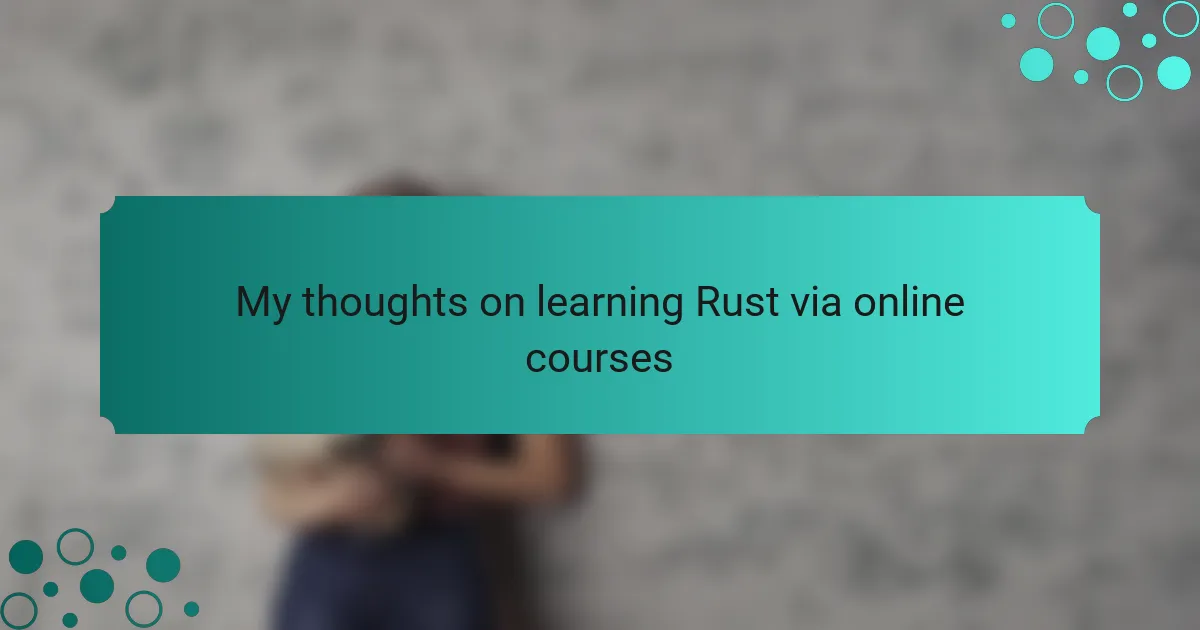Key takeaways
- Rust is a systems programming language that prioritizes memory safety and performance without needing a garbage collector.
- Learning Rust offers benefits such as strong community support, excellent documentation, and safe concurrency features.
- Online courses for Rust come in various formats, including video lectures, interactive exercises, and text-based tutorials, catering to different learning styles.
- Engaging with community resources and working on small projects are effective strategies to enhance the learning experience with Rust.
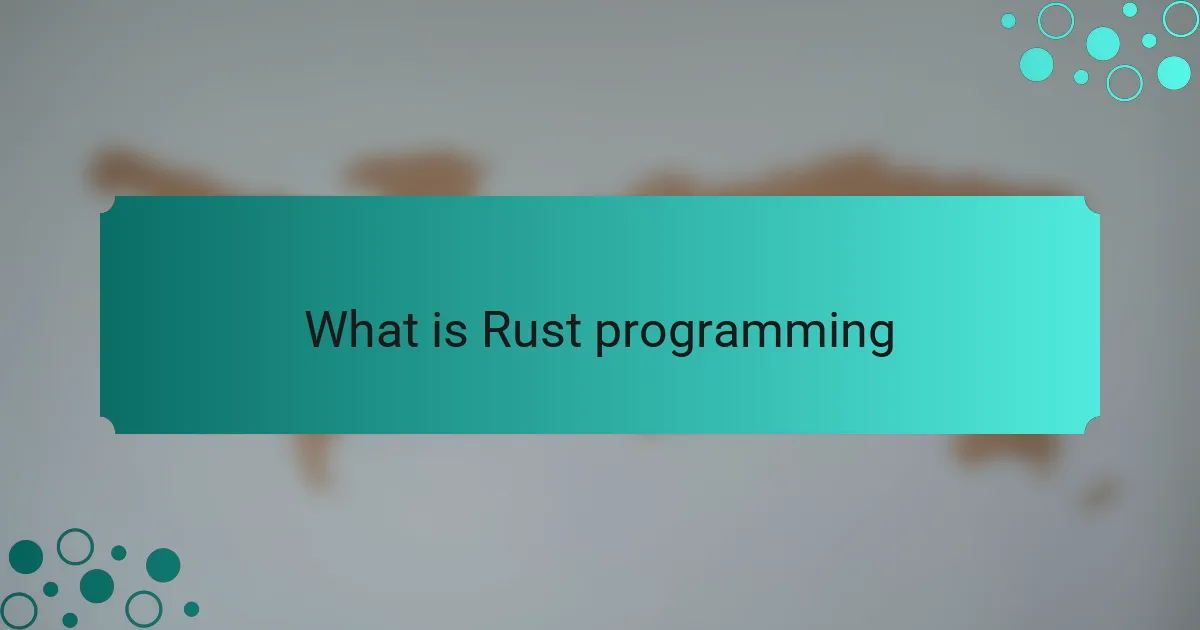
What is Rust programming
Rust is a systems programming language that emphasizes safety and performance. It was designed to prevent the kinds of bugs that can lead to security vulnerabilities, making it a great choice for projects where reliability is critical. From my experience, diving into Rust felt both challenging and rewarding, as its strict compiler and ownership model pushed me to rethink my programming practices.
One of the most attractive features of Rust is its memory safety without needing a garbage collector. This means developers can write code that’s efficient and fast, yet still secure – a balance that I truly appreciate. Personally, I found the learning curve steep at first, but each concept I grasped made me feel like I was gaining valuable skills that are increasingly sought after in the industry.
Here’s a comparison table to highlight Rust alongside some other popular programming languages:
| Feature | Rust | Python | C++ |
|---|---|---|---|
| Memory Safety | Yes | No | Partial |
| Performance | High | Medium | High |
| Ease of Learning | Moderate | Easy | Hard |
| Use Cases | Systems, WebAssembly | Web, Data Science | Systems, Game Development |
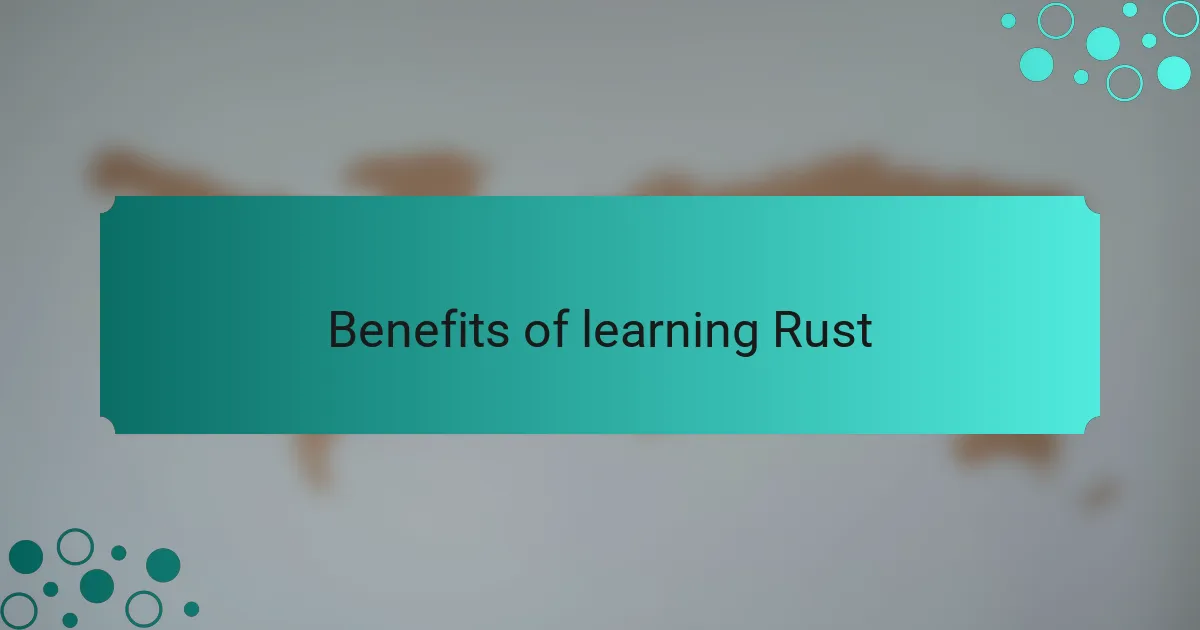
Benefits of learning Rust
Learning Rust has many benefits that can significantly enhance a programmer’s skill set. For starters, Rust emphasizes memory safety without needing a garbage collector, which can lead to more efficient and performant code. I remember when I first tackled memory management issues in other languages; the thought of a language that simplifies this was both exciting and relieving.
Another advantage of Rust is its strong community and documentation. When I was getting started, I found the Rust official book and other resources incredibly helpful. They guided me through the language’s complexities with clarity, which made my learning experience enjoyable.
Moreover, Rust’s concurrency features allow you to write safer multi-threaded programs. As someone who’s dabbled in multi-threading, I can attest to the confidence Rust instills when handling such tasks—it feels good knowing that I’m making fewer mistakes.
Here’s a comparison table that highlights some key features of Rust:
| Feature | Rust |
|---|---|
| Memory Safety | Yes, without garbage collection |
| Concurrency Support | Safe concurrency with ownership model |
| Community and Documentation | Strong community with excellent resources |
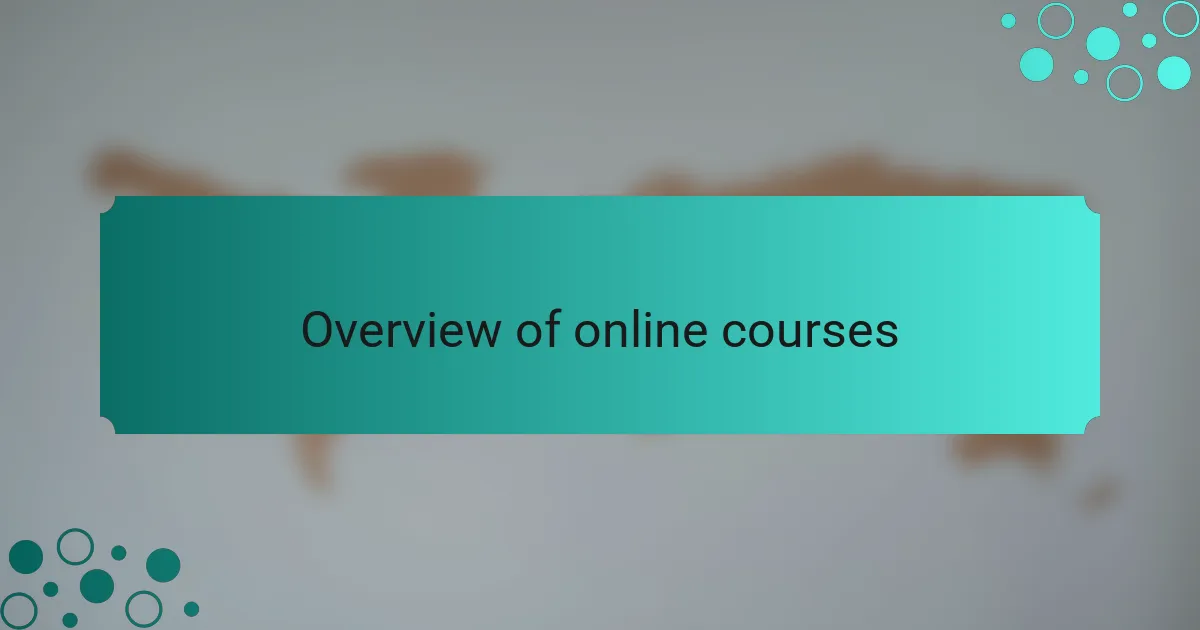
Overview of online courses
When exploring online courses for learning Rust, I found the diversity and accessibility of options quite impressive. The beauty of these courses lies in their ability to cater to different learning styles; whether you prefer video lectures, interactive coding exercises, or reading materials, there’s something for everyone. Personally, I enjoyed the structured approach of some courses, which provided a clear learning path while allowing me to learn at my own pace.
Here’s a brief overview of the key features to look for in an online Rust course:
- Interactive Coding Exercises: Hands-on practice helps solidify concepts.
- Video Lectures: Engaging visuals can enhance understanding.
- Community Support: Access to forums or chat groups for problem-solving.
- Structured Curriculum: A clear outline of topics ensures comprehensive learning.
- Flexibility: Learn at your own pace, fitting study around your schedule.
Finding the right online course makes a significant difference, and I encourage you to try a few to discover what resonates with you!
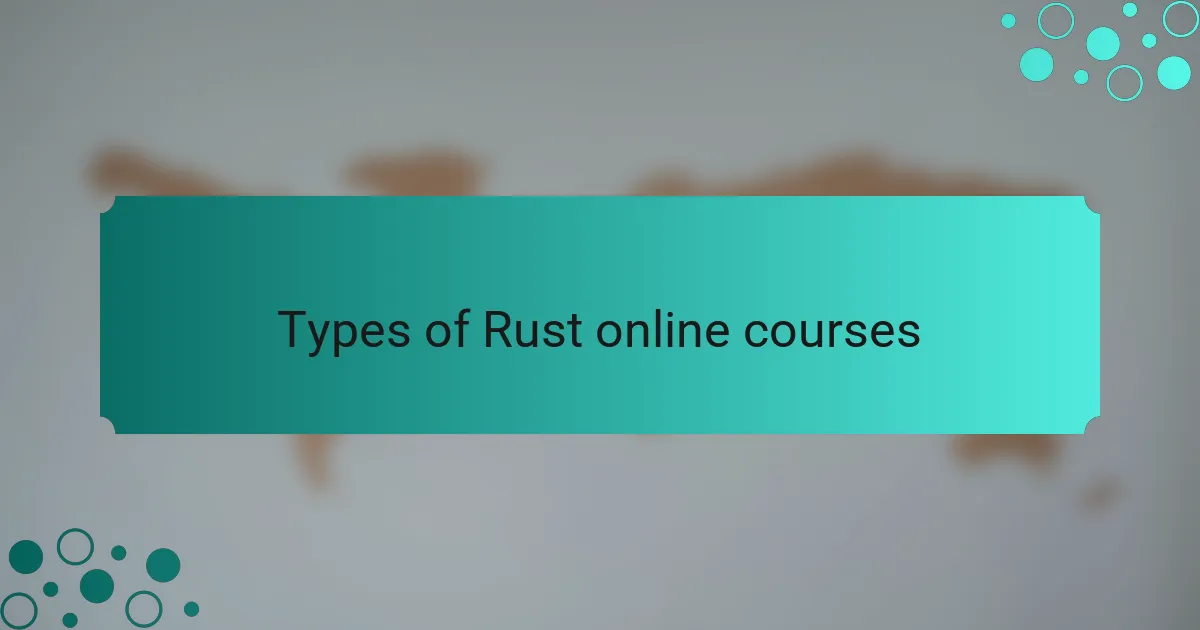
Types of Rust online courses
When it comes to learning Rust online, you’ll find a variety of course types tailored to different learning preferences. I’ve personally experimented with video courses, interactive coding platforms, and even text-based tutorials. Each format has its unique advantages: video courses can be immersive but can sometimes feel overwhelming, while interactive platforms engage you actively, which I find incredibly helpful for retention.
The differences in courses also extend to their depth and target audience. Some courses cater to complete beginners, while others dive deep into advanced topics like concurrency or systems programming. I remember feeling lost initially, but the right course at the right time boosted my confidence significantly.
Here’s a breakdown of the various types of Rust online courses:
| Course Type | Best For |
|---|---|
| Video Courses | Visual learners who enjoy guided instruction |
| Interactive Platforms | Hands-on learners looking for immediate practice |
| Text-Based Tutorials | Readers who prefer to study at their own pace |
| Project-Based Courses | Students aiming to build real-world applications |
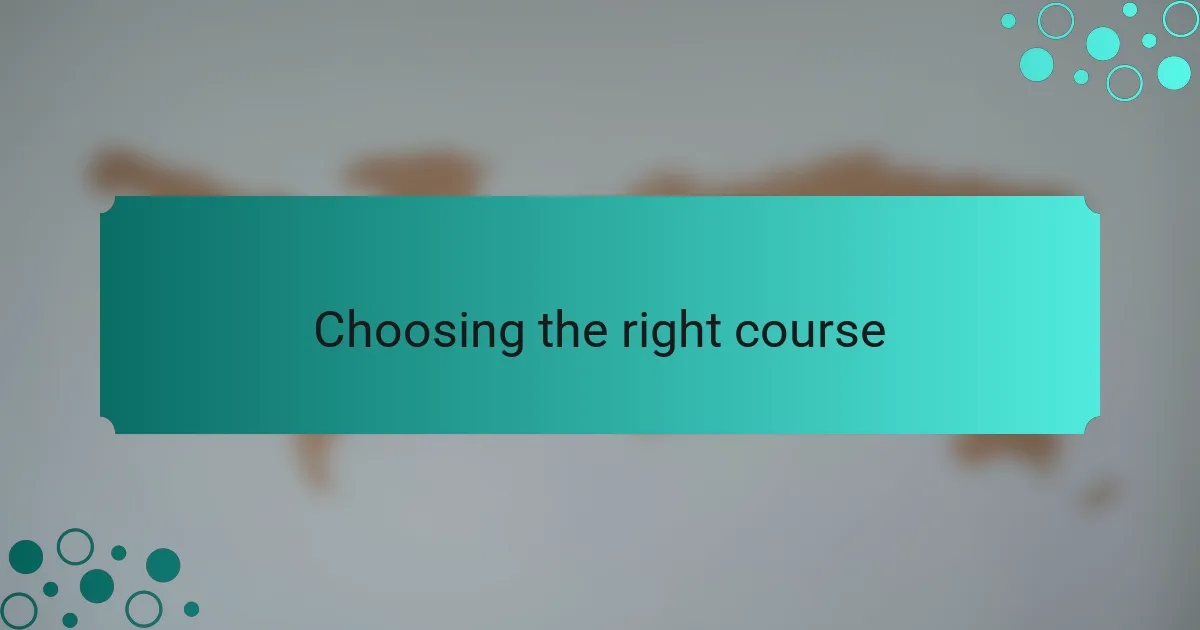
Choosing the right course
Choosing the right course can profoundly impact your journey with Rust. I remember sifting through various options and feeling overwhelmed by the sheer volume of content available online. It struck me that not every course suits everyone; it depends on your learning style. For instance, if you thrive with hands-on practice, you might lean toward interactive platforms. Alternatively, if you’re more of a visual learner, video courses could be your best bet.
Another aspect to consider is the course content’s depth. Some courses might offer an introduction to basic principles, which is perfect if you’re just starting out, while others delve into complex subjects like lifetime management and ownership principles. I often found myself wishing I had started with a more foundational course before jumping into higher-level topics, as it would have saved me some head-scratching moments.
Lastly, community engagement can’t be overlooked. When I discovered forums associated with certain courses, it opened up a whole new dimension to my learning experience. Sharing challenges with fellow students and receiving feedback from course instructors enriched my understanding of Rust. Have you ever realized how much easier it is to tackle a concept when you’re not doing it alone? That’s the kind of support a good course should provide.
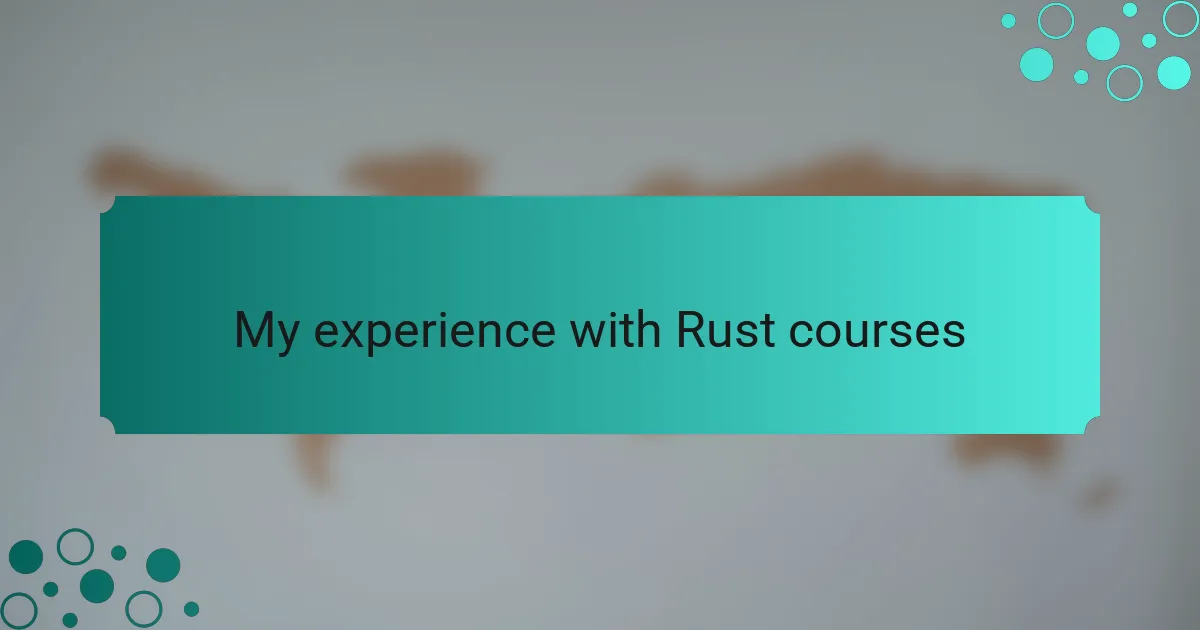
My experience with Rust courses
My journey with Rust courses has been quite enlightening. Initially, I found myself overwhelmed by the syntax and concepts, but gradually, these online courses helped me grasp the language’s intricacies. I remember the moment I successfully compiled my first Rust program—it was incredibly satisfying and gave me a sense of achievement.
The variety of courses available also struck me. Some focused heavily on theory, while others provided hands-on projects that allowed me to experiment with Rust in real-life scenarios. That practical application made all the difference in my learning experience, enabling me to relate the concepts to real-world challenges.
Here’s a quick comparison of a few Rust courses I explored, highlighting their key features:
| Course Name | Focus Area |
|---|---|
| Rust Programming for Beginners | Theory and Syntax |
| Learn Rust by Building Real-World Applications | Hands-on Projects |
| Rust: The Complete Developer’s Guide | Comprehensive Overview |
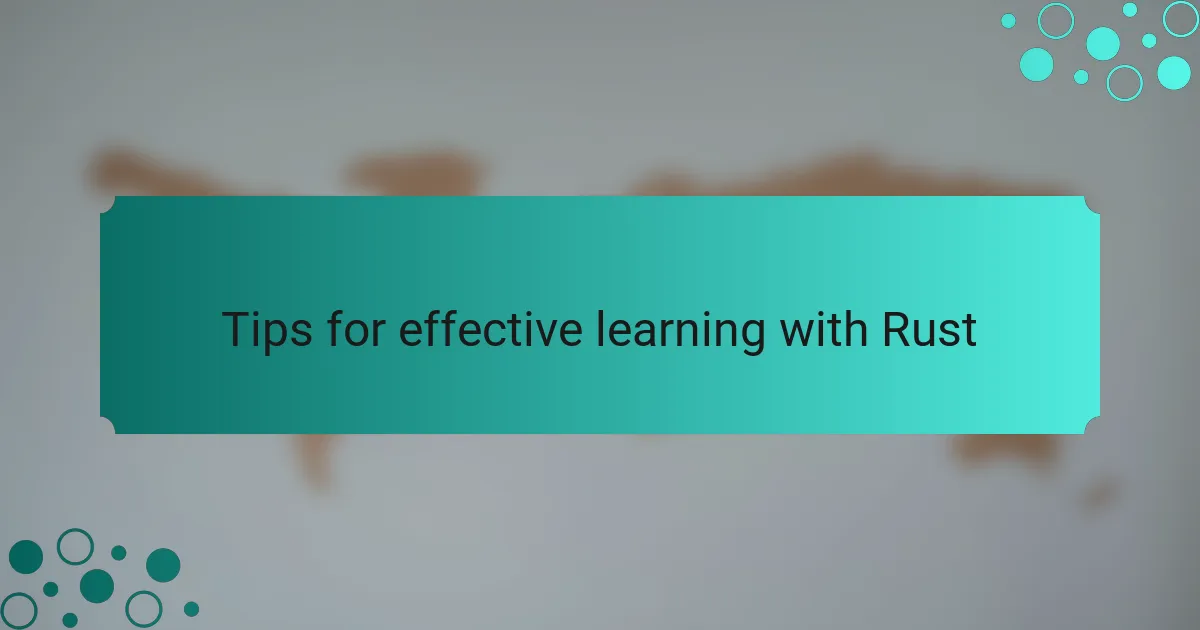
Tips for effective learning with Rust
When diving into Rust, I’ve discovered several strategies that really enhance the learning experience. First, engaging with the community is crucial. Platforms like Rust’s official forums or Reddit have been great for me, where I not only learned from others’ questions but also found answers to my own. It’s a powerful feeling to be part of a community while on this journey.
Another tip that has helped me is working on small projects. Each time I tackle a new concept, I apply it immediately to a mini-project. This reinforces my understanding and keeps me motivated. I remember feeling a rush of accomplishment when I built a simple command-line tool using Rust, solidifying my grasp of the language.
Lastly, don’t shy away from the official documentation. It’s thorough and, surprisingly, very readable. In my experience, spending time there has clarified many concepts that felt murky at first. Always remember, patience is key—learning Rust is a marathon, not a sprint!
| Strategy | Description |
|---|---|
| Engage with the Community | Join forums and discussion groups to learn from others and share experiences. |
| Work on Small Projects | Apply new concepts through mini-projects to reinforce learning and boost motivation. |
| Utilize Official Documentation | Refer to Rust’s official documentation for comprehensive explanations and guidance. |
